Text
A Very Merry Bollywood Romance: My Personal Favourites

I'm not going to say 'there's nothing like it' merely on account of the fact that I grew up immersed in watching hours upon hours of Bollywood fantasies, but rather because I can say with hand on heart that there's something about Indian cinema that really knows how to make you feel. I don't whether it's the oozing charisma and genuity of the actors; how passions and flavour is woven into every detail and gesture; whether it's the fact that your screen explodes with unapologetic culture and colour, or the way the music surges through you like wine through water. True, it can be ridiculously cheesy (to the point where I've even had to leave the room for cringing), but when it comes to mixing serendipity with the sensuous to equate with an experience of heart-rendering love, then honestly; nowhere but India can do finer.
This admittedly comes a little late after Valentine's day, however I was inspired to collab together some of my favourite Bollywood romances of all time (or at least the last twenty-two years) to share in the hopes of inspiring your next Netflix binge if you feel the itch to dive into something different (and better) than your usual rom-com agenda.
Khabi Khushi Khabie Gham (Through Smiles or Through Tears, 2001)
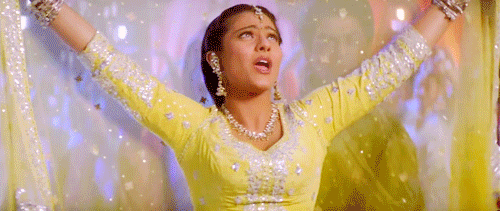
'If you want to be something in life, want to get something in life, or want to win something in life, then listen to your heart always. And if you don’t get any answer from your heart, then close your eyes; think of your mother and father's names, and see how you will reach your destiny, overcome all your hurdles. Victory will be yours. Only yours.'
You'd be hard pressed to find anyone in India who hasn't heard of this iconic number, this being India's answer to a cult classic like our own Bridget Jones or Notting Hill. Karan Johar's infamous blockbuster is a millennial Bollywood icon, and if you don't find yourself soaked in your own tears at least five times during the three-hour duration, then I would duly recommend getting your eye-ducts checked. And your conscience.
Khabi Khushi Khabie Gham (or KKKG as it is also affectionately known) is first on this list as it is as quintessentially Bollywood perhaps as it gets: entourages of lavish dance sequences and ornate cinematography, all the while underlined with emotional questions surrounding obligations not only to one's culture and home but moreover to one's self. It concerns the consequences of when Rahul (Shah Rukh Khan), adopted son of wealthy businessman Yash Raichand (Amitabh Bachchan), dares to forsake the perfectly selected match his father has picked for him for that of the exuberant Anjali (Kajol) from the lower-class sphere of Chandni Chowk. His choice in prioritising love over tradition and duty creates a fracture in the family dynamic over a span of ten years, this only finally being addressed when his younger brother Rohan (Hrithik Roshan) chooses to repair his broken family and reunite a dedicated mother (Jaya Bachchan) with her favourite son.
KKKG is one of my first choices whenever introducing newcomers to Bollywood as it would be difficult to find much to complain about with it. Yes it has its cheesy moments and a lot of the humour might require some cultural know-how, yet the comedy in question is so perfectly scripted that it doesn't detriment the moments of extreme emotionality - on the contrary, it positively amplifies it. I have additionally always had a soft spot for Anjali and Rahul as their relationship understandingly matures given the circumstances of their union, especially given Rahul's decision to move their small sect of their family out of India entirely. Regardless they still remain hilariously argumentative and flirtatious the whole way through, their more traditional relationship being paralleled through the younger and more westernised dynamic between Rohan and Anjali's younger sister, Pooja (Kareena Kapoor). The film is a package deal for all the emotions and a bonanza of some of the best acting talent in the industry, the love story being not just between one man and woman but towards one's home and family.
BEST SONG: Title Track
Mohabbatein (Love Stories, 2000)

'Love is like life; it's not always easy and it does not always bring you happiness, but if we do not stop living, then why should we stop loving?'
Now, Mohabbatein has a far more lavish layer of cheese slathered across it than the predecessor on the list, but that may be more down to how the cast is comprised of a camaraderie of newcomers alongside more the more accomplished acting masters. Mohabbatein is the story of three students who each fall in love whilst studying at the prestigious all-male college Gurukul under the lense of the strict headmaster Narayan Shankar (Amitabh Bachchan) - his most iron-clad rule bizarrely being that no-one is to pursue romantic relationships whilst under his roof for risk of immediate expulsion. Whilst all hope seems lost then for these horny *ahem* love-struck adolescents, enter the charismatic and emphatically romantic music teacher Raj Malhotra (Shah Rukh Khan). His presence at first seems innocent enough in his encouragement for the boys to nurture their affections as Robin Williams encouraged his own students in the pursuit of poetry, especially as it soon comes to light that Raj's own great love, Megha (Aishwarya Rai), committed suicide when her father expelled Raj when he learned of their relationship; determined that the two were not allowed to be together. That same father then being the unyielding Narayan Shankar.
Mohabbatein then makes for such brilliant cinema and engrossing romance as it combines all the freshness and innocence of young love with the intensity of passions that transcend the boundaries of life and death. The sense of pathos invoked by Chopra is interweaved into every detail of the piece, from music to performance; the preposterous and absurd. The confrontations between Bachchan and Khan in this piece are far more enigmatic than in KKKG given the different stakes between a father and son and the different types of love that two men can feel when grieving over the loss of the same woman. It proves one of my favourites time and again given how, for all the playfulness and somewhat ridiculous outlines in the plot, it is the eternalised love that is embodied by Raj and Megha, and the wondrous idea that not even mortality stands as a barrier between those that truly love each other, that will be hard pressed to feel like your heart might physically glow.
BEST SONG: Humko Humise Churalo / Zinda Rehti Hain Mohabbatein
Hasee toh Phasee (She smiles, she's snared, 2014)

'You are the oxygen to my double hydrogen. Our chemistry flows like water.'
This more modern film addresses far more contemporary issues than its predecessors, the complex relationship between Nikhil (Siddarth Malhotra) and Meeta (Parineeti Chopra) abandoning perhaps much of the traditional grandeur in place of what one could argue is closer to the standard quirky, slice-of-life style typical of an adolescent British rom-com. What is indisputable is that even without as much of a flair for the dramatic and the abundance of glamour, the film still radiates with a palpable sense of heart, as it invites us to explore what happens when flustered yet well-meaning Nikhil becomes saddled with looking after his fiancee, Karishma's, eccentric sister during the week before their wedding. One can't help but chuckle and squirm as we watch Nikhil's hapless attempts to pass Meeta off as a long-lost friend to his family and friends in his and Karishma's efforts to conceal her from her own family, the reasons for her freakish personality going unspoken except for the ominous pills she keeps popping on the sly.
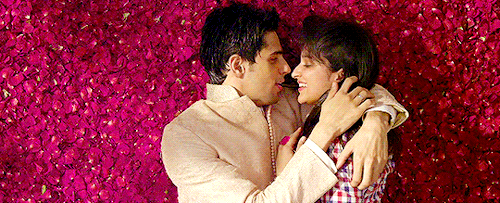
We soon realise the reason Meeta has been isolated from her family is due to how she chose to prioritise her academic ambitions over that of the traditional femininity and getting dolled up for the purposes of marriage and domesticity; the disappointment invested towards her paving a way for a natural connection with an equally lost Nikhil in his endless efforts to appease the incessant demands of his more materialistic fiancee. This then is what makes the film even more compelling given how it goes against the culturally ingrained stereotypes of the man managing to be the effortless, seductive hero, able to provide and fight for the woman he loves in conjunction to the beauteous and elusive heroine. Instead, it invokes a relationship about two people who feel lost in the oppression of society's expectations, the result being that despite judgemental relatives and unstable emotionality, the two are able to find something magical that can only be brought out in each other.
BEST SONG: Ishq Bulaava / Manchala
Pardes (Foreign Land, 1997)
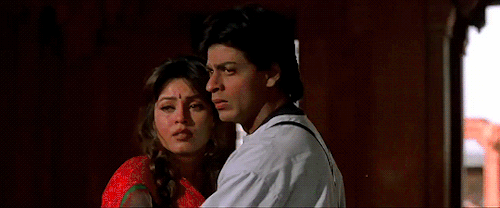
'You've all mistaken me for some innocent little painting that you've framed in gold, and now you want me to hang on these walls in silence and become a part of this false decor! This isn't the dream I came to this foreign land with, is it?'
Now, this is a controversial one. Pardes is probably the most politically charged movie on this list as it is famous for being an incredibly evocative piece of anti-Western propaganda. It concerns what happens when free-spirited Ganga (Mahima Chaudhary) is handed in marriage to the son of a wealthy NRI (Non-Resident Indian), however the vastness of the difference in culture on top of the distance between India and America sees to it that the outcome of such an engagement comes to some horrific consequences. Pardes is primarily then about the clash between cultures when the innocent essence of India is dragged to and exposed within the more confident and lavish shores of America. This premise in itself may seem problematic and would understandably evoke outrage as America is intentionally built up as the criminalised empire in the face of the all-pure India, however, what the viewer must remember when watching Pardes is that it is quintessentially a story about consent and respect. It's about acknowledging the difference in cultures and adhering to ways of life you may not understand, rather than trying to overwhelm and consume that sense of 'otherness' like a tyrannical Frankenstein 'penetrating into the secrets of nature' and causing chaos for everyone. It is fair to say then that Pardes is problematic and the socio-political accuracy of the piece could be spat upon until the cows come home, but it is this sense of duality and complication that makes it so interesting.
The main romantic storyline of the film then may be more of a Trojan horse for the more significant aspects for discussion, but it is more than fair to say that the political stakes are squarely matched by the passions at play. After all, when the wholly Americanised Rajiv (Apurva Agnihotri) proves to be more than a little bit of a disappointment, it is the relationship between Ganga and his adopted brother Arjun (Shah Rukh Khan) that comes to full heart-warming fruition. Arjun's role as the mediator between Ganga and Rajiv in trying to fulfil his adopted father's wish in smoothing the match over quickly escalates to into him becoming Ganga's most trusted confidante and defender. One can recognise perhaps the outdated sense of chivalry in this - especially as the inclusion of the attempted rape scene does appear to be an excuse for tensions to culminate in a traditional, Bollywood-esque full-on fist fight. However, credit has to be duly cast to the writers as they characterise Arjun as possessing a rare sense of compassion and empathy, especially given how his proclamation of love for Ganga is based not on lust but his genuine desire to trust, revere, respect and protect. In addition to this, it is easy to admire Ganga for her perseverance in trying to navigate this foreign land, she becoming all the more engaging for her burgeoning determination without the expense of her self-respect and ingrained love for her home nation. The prioritisation of one another's welfare above their own alongside becoming embroiled in their sense of duty to tradition and family is then what makes their journey towards each other so compelling and heart-wrenching. Pardes is a love story with incredibly heavy undertones that would have to be entered with a particularly open mind, but perhaps once the offences have been fully digested, one can fully appreciate why the film is so renowned; with a love that is all at once devastating as it is wonderful and profound.
Devdas (2002)
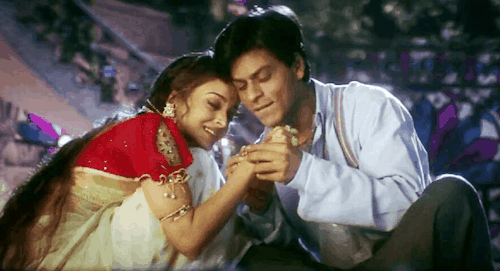
'Where can I find again my lost innocence? My lost dreams? My lost childhood? What happened to my home in the shade of the trees?'
If there was ever an answer to the intensity and literary grandeur of tragic romances the like of Romeo and Juliet or Abelard and Heloise, then Devdas slaps back with unparalleled panache. If it wasn't a love story in its own right then Devdas is indisputably an affair for the senses; Sanjay Leela Bhansali's breath-taking production instilling every scene and action with such aestheticism that the Pre-Raphaelites are, no doubt, positively quaking. The story is no doubt a tragedy, following the titular character's (Shah Rukh Khan's) debilitating descent into alcoholism following his childhood sweetheart, Paro's (Aishwarya Rai), marriage after his mother ridicules her family for being descended from prostitutes a long time back down the line of their ancestry. Ironically enough, he seeks relief in leaving his home and taking shelter with a friend who works at a brothel, his emotional deterioration subject to the fruitless effortless of the heartfelt taiwaif (courtesan) Chandramukhi (Madhuri Dixit).

The relationship between Dev and Paro is continuously fraught with psychological manipulation as the two try to progress with their lives whilst undeniably in love with each other, the acting on the parts of Khan and Rai being so invigorating that it would not be surprising to find yourself holding your breath whenever the two are on screen. the interactions between Khan and Dixit are additionally moving as they have a deeper understanding of one another, their relationship perhaps being all the more rueful in the sense of it being a one-sided sense of self-sacrifice as Dev continues to ruminate over a love he can never have. Indeed, though Khan is typically praised for his rigorous performance, it has been disputed that it is perhaps the talent and dynamic between Rai and Dixit in their roles as Paro and Chandramukhi - the aristocrat and the courtesan - is the actual showstopper in this magnificent piece. It was never in the original story after all that the two women should have a relationship outside their original and comparatively brief confrontation over who loves Dev more, so that fact that Bhansali chooses to instal and flesh out the friendship between these two equally fierce and magnetic women is but one of the aspects that makes this film so essential and inspiring.
BEST SONG: All of them omg
Goliyon ki Rasleela Ram-Leela (A Play on Bullets: Ram-Leela, 2013)
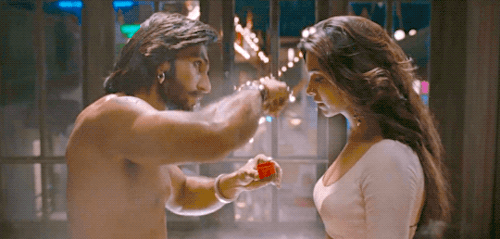
'If hatred and pride can make a desert of the sea, then love can make flowers bloom here.'
Let's establish this from the start - Baz Luhrmann can choke.
This is how a real Rom-and Jules-adaption is done. As the most sultry addition to the list by far (seriously, phew), Ram-Leela admittedly does take a lot of liberties with the narrative. Nevertheless, any alterations or revisions that have been made are entirely for the better. In fact, even if you were to take the stance that Romeo and Juliet were as young and naive as they are in order to heighten the tragedy of violence and conflict, then it becomes more than reasonable to argue that Ram-Leela actually captures the essence of the play more than the stagnant Western replicas that have plagued us in the past. We still have the warring families, the star-crossed lovers and poetics on steroids, only that the narrative is enhanced by the rawness of rural Rajasthan to bring Shakespeare’s message to better fruition. Indeed, if you, like me then, have always been able to appreciate the ideologies behind the original play, yet remained impatient with the immaturity and implausibility of the titular characters in spite of yourself, then Ram-Leela provides the perfect amendment to all those irritations. Instead, we see two leads who are far more enthralling and philosophical, the opposition between them being so devastating given how Bhansali interweaves dramatic irony with frustrating relish. It comes down to how the Rajadis and Saneras cause the original Montagues and Capulets to look embarrassingly spineless by comparison; their inconceivable prowess in being able to manipulate even their own playing on our expectations so much that it cements the romance firmly within the boundaries of tragedy.
Indeed, we are not just treated to a brief separation between the two until the time of death, but rather the stage is reset so that Ram (Ranveer Singh) and Leela (Deepika Padukone) become the respective heads of their families and are forced to war against each other - and not entirely against their own wills either. The film encompasses a similar sense of passionate antagonisation that abounds in Devdas as well then, the irony being that the more fraught and frayed the relationship, the more your heart aches for want of the forsaken lovers to be able to make it. In truth, the film actually starts out ridiculously playfully with bounties of energy and innuendo, the fact that it is able to convincingly transition on its axis to become so emotionally straining being a credit to Bhansali's directorial ingenuity. Of course, the chemistry between the leads in Ranveer Singh and Deepika Padukone is near indescribable, both balancing refreshing elements of mischief and charm alongside intense vulnerability and ardour. Critics have labelled their performances as probably being still the finest of their careers (which is saying plenty, trust me), the camaraderie between the two hardly being surprising. After all, the two did just get married late last year - and on the anniversary of the film's original release date no less! So if that doesn't convince you of the quality of such a love story, then I'm afraid that you will be convinced by very little else.
BEST SONG: Lahu Munh Lag Gaya / Nagada Sang Dohl / Laal Ishq
Kal Ho Naa Ho (Tomorrow might not be, 2014)

'Listen - live, be happy, smile, because who knows? Tomorrow might not be.'
Honestly, in light of all the films that have been listed before now, with their mind-blowing cinematography, incredibly moving soundtracks and ground-breaking scopes of acting, Kal Ho Naa Ho might seem to fall a little short. It's set in the dreary din of New York, the soundtrack is more constructed towards fun and contemporary glamour, yet it is undeniable that this film is my favourite of the whole bunch. The top of my list of romantic Bops then is the story of Naina (Preity Zinta) and the many complications which taint her family; the pressure being so much that she has been rendered the constant embodiment of irritability. And even forgotten how to smile. Everything turns around when Aman (Shah Rukh Khan) enters the family's life: optimistic, charismatic and caring, he literally breathes new life into Naina's existence, so that before long she finds herself completely devoted to him in place of the unspoken affections of her closest friend, Rohit (Saif Ali Khan). What pans out is that on the verge of telling Aman she loves him however is that he tells Naina that the reason he came to New York was to repair his frayed relationship with his wife, Priya (Sonali Bendre). Unbeknownst to the bereft Naina, this is, in fact, a lie. The truth is that Priya is actually Aman's doctor and he doesn't have much time left to live.
I don't know then whether it's because the characters and scenarios are so well grounded, the dynamics and difficulties within the Kapur family are more relatable, or that the relationships between and constructions of characters are perhaps the most believable, but it's one of those films that you'll agree, once you've watched it, has an inexplicable sensibility that takes the cake every time. A lot of it does seem to be grounded in the healthy and brilliant way the love triangle is handled in the film, as any sense of complication or rivalry between Rohit and Aman is evoked as comedy rather than any serious resentment or envy. It's an incredibly unique love triangle then and this is perhaps why it has garnered so much critical respect, as the love-triangle motif is such a typical motif of Bollywood cinema (with repeatedly toxic and violent confrontations like in Pardes), that it is refreshing to see a love depicted so genuinely and platonically. It's even more heart-warming to watch as Aman does his best efforts to ensure that Naina walks with Rohit down the aisle (or the Saptapadi to be precise) all the while wielding his best façade so that she never realises that he loves her too. In fact, the affections between them are so subtle and few that the effect is paradoxically more intense, as you find yourself latching onto every fleeting sign of love between them that you can. KHNH then is another one that I recommend first and foremost, though in truth it's best not to watch it too often unless you have a few days to spare in which to emotionally recover.
BEST SONG: Titular track
And there you have it - they may not be the best according to everyone's taste, but the romances listed above are some of the most critically acclaimed and effective Bollywood masterpieces to ever grace the silver screen. Though they may start as cliched and melodramatic, with too much dance and quirky dynamic, this is always a foil to deep-rooted passions and die-hard affections - each a romantic experience above and beyond any of your expectations.
Tanika Lane
9 notes
·
View notes
Text
Kiss with a Fist Indeed
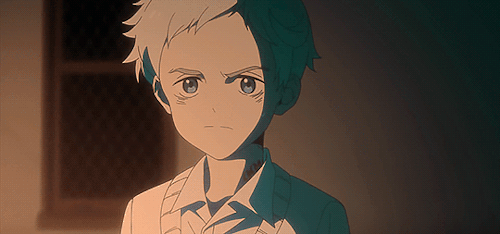
The Promised Neverland Episode 6 Review
Na na naa na na naaaa - so there was a bit of a fight. Tensions ran particularly high this episode when our golden trio finally decided to lay all their cards on the table with Don and Gilda, and it is fair to say that the results were rather explosive. It is a relief that they were, however, for whilst it is true that the previous episode was intriguing in terms of being tactically and manipulatively correct, there was a concern that the anime may have been losing its mojo. What we can appreciate now is that the previous episode was an effective calm before a storm that Juno would be proud of - an effective means to maintain the suspense of the anime with renewed vigour and pristine pathos.
So as addressed, the first major and most outstanding element of the episode was how Don and Gilda have now become fully imbibed into this ring of fire - the Golden Trio now upgrading to become the Famous Five, per se, except that the initiation was so overwhelming for the poor newcomers that it earned Ray, Norman, and nearly Emma, some very dynamic swats to the face. In slow motion and everything. What is notable about this whole interaction, and how you could tell that the anime had artfully plotted the narrative to allow it to become far more stimulating, is the fact that this moment was actually more intense and disturbing than even the revelation with Norman and Emma in Episode 1. Which, if we care to remember, involved not only seeing the ghoulish, slithering monsters themselves, but additionally the horrific ragdoll of a corpse that had been one of their dear pseudo-family members only a short while before. Indeed, we might actually say that the first revelation then was designed to flair with jump-and-scare; to embellish how we are meant to have felt as chilled to our core as they did.
The effect here was different.
True, Don throwing the sudden punch at unsuspecting Norman does create a rather whiplash effect, but the result is rather more emotive: as if you were watching your own beloved children go at each other with tooth and nail rather than a bratty spat. The animation here was particularly fantastic as you could sense the rage reverberating from Don even before he was let loose, the use of levels as looms over and seems to elongate out over Norman and Ray being powerfully intimidating. Of course, the pinnacle of the panache is instilled in the eyes, the being paramount as Don practically hisses his demand to be told the truth about whether Conny is dead or alive from a particularly bereft Emma. In fact, you might even say that a fair bit of the fear that she felt in Episode 1 is replicated here, except now she fears the rage of her own family member rather than the literal beasts themselves. What is additionally interesting is actually how the eyes between the two in this interaction are actually rather similarly depicted - both vast white spaces with minute pupils. However, it is the contorted, Commedia-like contrasts of fear and furor which makes for highly invigorating staging.

Don then is arguably the main focus of this episode as his character becomes more fleshed out - Emma'a athleticism being matched by his macho libre; this being perhaps why they make the most compelling dynamic on screen as she was the only one of the three for whom Don had to hold back his punch. He comes across as being a particularly triggered spin on the White Knight motif, especially given, for all his rashness, you cannot help but empathise with the fact that this is all fuelled by the grief of losing Conny. It is unfortunately disappointing how the narrative decides to justify Don’s behaviour with the traditional excuse of wanting to be ‘relied upon,’ 'trusted with the information because they’re friends/ family’ etc. - this being a typical schtick to the point of the derivative in shounen anime and manga, if we’re going to be honest. However, the genuity of Don’s reaction and the stream of tears later on takes the edge off the possible annoyance, this being probably due to how we aware of what initially tipped off both he and Gilda to Conny’s death before he even had a chance to talk to Emma and Co.
This is due to what Don and Gilda found in the pursuit of Mom’s hidden room connected to her office, under the assumption that the worst at play here was merely human trafficking and the false hope of Conny still being worth saving. We then are not only indulged with seeing where the communication device she uses in Episode 3 is hidden then but what is even more paralysing is the room that Don and Gilda come across in the dim torchlight even before that. It is a room full of toys. Momentos, if you will, of the orphanage’s previous occupants. Before they were, you know - devoured. The realisation of what these toys mean comes to its fully horrific realisation when the light falls upon Conny’s stuffed rabbit, which only becomes all the more disturbing to look at each time it keeps popping back up. The effect is almost as if they had walked down into a mausoleum or a tomb, especially as the room in question is downstairs in a small cellar; the bodies of each toy being as if they were the body of each child. This necrophilic ekphrasis then is a brutal reminder of the mutation that is Mom’s sense of morality - as if we really needed this prompt of her keeping these stuffed skeletons organised as if they were trophies under her bed. This is epitomised further in the episode as we are hit with yet another revelation - she telling her triple (or is it quadruple by now?) agent Ray that the next shipping date has been advanced to happily coincide with his twelfth birthday. Paradoxically, it is the lack of eyes in this instance that actually instils more fear here, or rather how Mom is depicted as blocking the light as she stands over Ray and 'beams’ down at him instead, the effect of this being quite alarming as it is as if she could adopt the guise of Medusa and turn us to stone even with her eyes closed. It is a poignant reminder therein that if we and the kids really think that she can be outwitted even by Ray, then to quote a popular meme - they got a big storm coming.
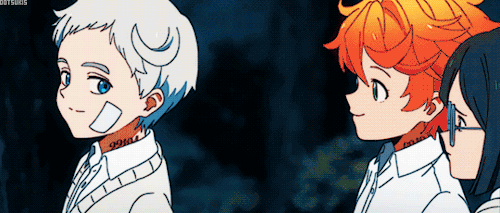
Of course, no episode is complete by now without a dazzling (and frankly crippling) cameo from dear Sister Krone - her ability to make you feel as if you had wet yourself (or at least choke on your breakfast as I *might* have done) highlighting that she is such a crucial part of the narrative now that it can barely afford to be without her. Indeed, her absence in the previous episode may be an ample explanation for why the action felt so comparatively dry. What is certain is that she ploughs back with unrelenting force this episode, and considering how she occupies the screen for no more than thirty seconds at most, this is a real credit both to the eccentricity of her character and ingenuity of the animators in turn. The direction here is inspired - the screen slowing down so suddenly and deliberately as Sister Krone cuts into view from where she was hiding behind a tree; eavesdropping on the most recent developments in the children’s bid for freedom. It is almost as if the drop in our heart rates may have been scripted in turn, but the biggest twist is that she has chosen to approach the kids not with scare tactics (though not for want of trying), but an ultimatum. Indeed, she offers a team up - as to what exactly or why we cannot say for sure until the next episode, but it seems clear what Sister Krone’s intentions have been for a while now. Indeed, I refer to her ambitions to overthrow Isabella from the nest and take over as the stuffed duck, so it will be interesting to see what kind of rhetoric she seeks to weave that will be successful in towing the children over the line. Of course, what is also deliciously enticing is whether or not she even plans to keep her word, as she like Isabella is privy to the crimes of rearing children as livestock as well. Feeling trust towards her then understandably wears a wee bit thin, but no doubt still provides a thick layer to the narrative as we wait to see whether oil really has a chance of mixing with such stagnant water.
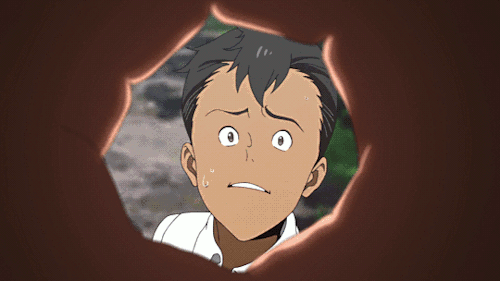
Tanika Lane
5 notes
·
View notes
Text
Tinker Tailor Soldier Spy

The Promised Neverland - Episode 5 Review
So it turns out that one of our titular trio, Ray himself, is our traitor after all. The fifth instalment is less action-packed than the predecessors we have been treated to so far, however it still manages to maintain it’s own tantalising flavour as we are treated to a very disturbing side to Ray - the most being that someone so comfortable with sacrificing his own kin and numbing themselves to shipping them out as stock has been compact into the mind of a child.
In truth, I was almost disappointed with the way the episode was headed. Between the swinging pendulum of the screen cutting between Norman’s determined expression and the back of Ray’s head alongside the ‘uncharacteristic’ reversal of Ray’s demeanour, there was potential to think the series was becoming tedious both by repeating its own tropes a little too often (as if we’re not aware that this is a race against time by now) as well as mirroring the style of villainous behaviour that we’ve recognised from other anime before. What we can suppose we have to thank for not finding the whole interaction between these two overbearing then is the creativity in making Ray seem all the more manic; his behaviour not cohesively matching with what he’s saying, and perhaps the fact that even calm and collected Norman is repeatedly thrown off by what his supposed friend is saying is more than enough to make us feel ill at ease too.
Though this was rather anticipated, we learn that Ray has been Mom’s spy for quite some time - ray not only being aware of the children being shipped out but also having the power to try and work out how much of an advantage he has over Mom before being shipped out himself. You can tell that the animators probably had a lot of fun with making Ray’s expressions as debilitating as possible, taking advantage of his one visible eye and narrow pupils to elevate him to Phantom-of-the-Opera-esque levels of menace. What is particularly evocative about the whole interaction is that, though Norman seems to make sense of Ray’s motives and Ray himself details the fact that everything he’s done has been for the sake of his, and specifically Norman and Emma’s survival, the scene ends with a tangible sense of uncertainty and perhaps more confusion left in the mind of the viewer than when we first entered in - of course, that could be just me. If anything then this heightens the prestige of the anime, for even when the motives and aims of Ray and Norman are painted in black and white (watching these two young friends having to play each other being all the more heart-rendering in its own right) we are still left with an undeniable sensation that there lies an ulterior motive of meaning lurking out of sight. The clash of ideals between Norman and Ray is increasingly engaging to watch, the power dynamic constantly shifting between the two as if we were watching Jackyll and Hyde battle it out on the screen all at the same time.
It is still hard to know entirely then whose side Ray is on or ultimately what is his motive, especially as one of his bargaining chips with Mom has not even been that he expects to survive. Indeed, he merely tells Norman that he asked Mom to put off his shipping date as late as possible, this apparently being so that he can ask ‘rewards’ off of Mom and thereby see how much he can get away with demanding of her. His psyche seems to titillate as much as the pendulum of the clock itself given the switches in expression on his face - one second seeming like he is covering his eyes in cowering pain, the next delivering such a penetrating stare that creates the illusion of him being in complete power. He definitely creates that impression when he leaves Norman given how he leans into putting his hand on the latter’s shoulder and whispering a slight threat in his ear, the effect of this being all the more chilling given how the light goes out of Norman’s eyes and is left visibly shaken after Ray is gone. But we quickly become aware that Ray is still a victim here too, no matter how much he may not act like it himself. We see this in his interaction with Mom and how, though she still wears her poker face of pride with perfection, she voices her observation - and threat - that Ray better not fail to overlook the perceptiveness of his friends again.

The constant transitions not only between the expressions of the characters and their different facades therein then is so dizzying that it’s hard to keep up - but then that’s what makes up half the fun. We are additionally to another tantalising nightmare as Norman dreams of all the orphans - including Emma - seemingly drained and decaying in the tunnel that leads out of the orphanage. Whilst the large jaws (with the tiny head of Mom on top if you noticed) is cinematically scary, what is the most interesting aspect about this sequence is the recurring motif of the flowers that are growing in bunches out of each of the kids. We first notice these flowers not just growing out of Conny’s corpse but it is even a prominant motif in the OP and ED of the anime, yet we are still not completely sure what these flowers of death mean. What we can additionally empathise with then is the fact that Norman is clearly far more afraid about what is going on than he lets on to be, his attempts to maintain his own facade and act as the almost adult of the group making his character all the more engaging.
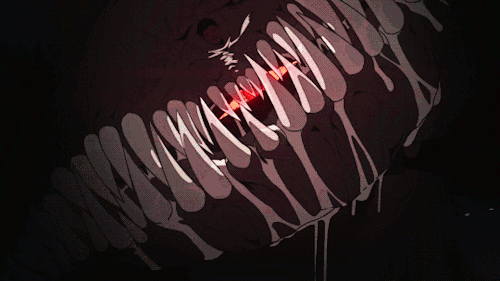
But of course, the episode additionally makes sure to still leave some room for lightness and comedy given how ray so easily reveals the fact that he has been the snake all along when the boys talk to Emma about the next course of action whilst alone in the forest. Indeed, the snappish transitions between the steadily kookier faces of each kid becomes more hilarious by the second, the hilarity being almost ludicrous given the very real danger of their situation. But then, this is what grants this particular anime it’s charm, and if we couldn’t find our main trio funny and loveable, then we wouldn’t ultimately much care for their welfare and rescue. This moment between the three however also ends up being most prominant as it is perhaps the first time we see Emma make the closest thing to a legitimate threat. Her conversation with Ray seems to hint at more guilt in him than the previous night’s dimly lit and more threatening tit-for-tat with Norman, as what seems to catch both the boys - and us - off guard is how Emma can still possibly still appeal to compassion. In fact, we can almost come to agree with Sister Krone noting Emma’s naivete; the narrative perhaps best being careful as the show progresses as this trait of Emma’s is beginning to take a toll on believability. But what creates more guilt is how her questions to Ray - despite the gravity of what she’s saying - is so direct, and so precise. It’s disturbing to see her so calm, when a few episodes ago her nerves were threaded in knots.
Indeed, what makes her severity towards Ray then all the more unnerving when she realises how he knew about each and every one of their former friends becomign lambs for the slaughter, is that her face is like a micture between fury and fear. Even the action of her taking his hands is quite poignant, as this again evokes the significance of manipulation through touch in this show; thereby showing that even Emma is being forced to prematurely manipulate and mature. She tells him never to do anything like this again. The question then is her expression pitying, or - given how nothing is perhaps more dangerous than one who knows no ends to love - another level of predatory?

Tanika Lane
1 note
·
View note
Text
Right Little Ray of Sunshine

‘The Promised Neverland’ Episode 4 Review
The fourth episode of The Promised Neverland sees the sands of time seem to grow ever thinner as Emma, Norman and Ray not only have to grapple with the ever more frenzied Sister krone on their tails, but additionally with having to handle the crippling reality that there must be traitor amongst them - a spy that would squander their chances of escaping a fate of being reduced to Demon-feed.
One of the most interesting aspects that is brought to our attention is not just the issue of the traitor, but rather a question concerning Sister Krone - that being, could she have been a child of the farm? The hierarchal relationship between her and Isabella was after all established in the previous episode, however, the latter's reminder to sister Krone as to who exactly is the 'Mom' of the house becomes further significant given their interaction in this episode. 'You're a smart girl,' Isabella reassures a flustered Sister Krone, 'so don't make any mistakes from now on.' This in addition to Isabella then telling Krone to 'behave' is clearly condescending language, and her role as 'Mom' suddenly seems to literally apply just as much to her in the same sense as with the children rather than it being merely the title assigned to her boss. Indeed, we even see Isabella carefully place her hand on Krone's cheek when talking to her just as she did with Emma back when suddenly confronting her in Episode Two. This caress then can be interpreted as symbolising her tenderness and care as a critical component of her manipulation and betrayal, the fact that this seems to have had a lasting impact on a now grown woman whose behaviour is like an insidious parody of a child's causing Isabella to become both more despicable and forbidding.
This then links back to the prevalence of the role of the traitor within the episode, a particular moment being when Norman asks Ray why someone would want to betray someone else whilst casually doing the laundry. One answer Ray offers is that the traitorous party may be granted a pass card to adulthood in exchange for information, and so this may indeed may be the case for Sister Krone. We almost even come to sympathise with her after her confrontation with Isabella, as she slowly walks into her room, lifts up her ragged doll, lets out a small sob … and then proceeds to rip off the head of the baby and pummel it's cotton carcass to a swindle, all the while accompanied by her familiar musical motif of what sounds like a broken merry-go-round. The contrast between her aggressive actions and contorted face with the score then serves to immediately re-establish the fact that the women is a raving lunatic, for despite her admittable intelligence and skill, she still is no match for her superior rival in Isabella.
Indeed, the contrast is rather like the Laocoon to Sinon, the Wife of Bath to the Prioress; emotionality overshadowed by calculation and cunning. Furthermore, this essentially implies that trying to empathise with Sister Krone would be a waste of our time, we come to wonder whether this is an indication of how our attitude should be towards the other traitor - the sense of dread gravitating towards the idea that a child could already be as destructive and power-hungry as she. After all, Norman even seeks out Emma's opinion as to whether or not she would leave the traitor behind in their escape, her unsurprising insistence to the contrary being significant as it makes the traitor seem all the worse in the face of Emma's overwhelming compassion.

Gilda continues to be built up as the primary suspect for traitordom, the top trio's choice to confide in both she and Don about the reality of their situation (except that the fact that their brains are being processed as Demon-fodder being watered down as human trafficking) causing her characterisation to titillate between whether or not she's acting or was just trying to look out for her friend in Emma. She is made to seem all the worse when shown later sneaking out of the bedroom at night and shooting a dark, blank glance over her shoulder to where Emma slept, yet her character is impressively reimbursed in her overall decision to stand off against Sister Krone. Indeed, her resolve is especially endearing considering Sister Krone's behaviour, for when you think the latter couldn't get any creepier, the animators continuously prove us wrong - to the battering of our nervous system. Gilda even bodily pushes Sister Krone away despite the implied offer of extending her life expectancy, so that we not only feel gratification towards this loaded act of valour, but this actually is somewhat comically satisfying given how Sister Krone tries to replicate Isabella's key manoeuvre: the artful hand on the cheek. Evidently, the move failed, and so we not only find pleasure in Sister Krone's mounting fury, but also in the renewed trust between Emma and Gilda as well.

The eventuality is that the traitor is called out by Norman is Ray - and in a perfectly sinister way. Norman stepping into the shadow as the music cuts off is such a subtle yet chilling action, as it creates a claustrophobic sense of unease; his accusatory gaze and closing the space being as if he were surpassing Ray altogether to accuse the viewer. However, considering how Ray has been established as being a key component of the man three characters, it seems unlikely that this accusation will bear much fruit - for even if this does end up being true, it will be interesting to hear the excuse that gets him off the hook. The accusation does make sense in light of Ray's behaviour in this episode as he was evidently frustrated by Norman's plan to move the escape plan two weeks forward, as well as his chastisement pf Norman for not telling Gilda and Don the complete truth about the escape. In retrospect of this however, this actually evokes some empathy for Ray, as his excuse to Norman as to whether an informant would be guaranteed their lives may be interpretable as Ray subconsciously trying to gain validation from Norman.
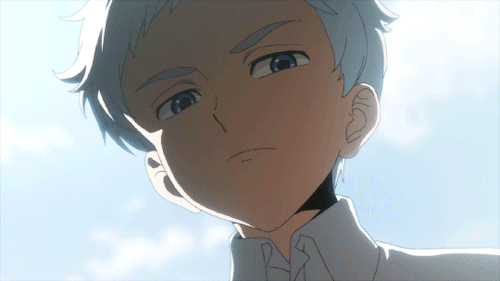
The dynamic between them becomes more complex as Ray's dry nature actually seems comparably immature to Norman's calm determination. In fact, you could actually say that Norman comes out as the more interesting character from this interaction, the sense of malevolence surrounding Norman building since even Sister Krone was outsmarted by he and Ray in the chase in Episode 2. There was clearly more emphasis on Norman through the use of levels and the accusatory beam of sunlight outlining his stature, towering out of the reach of Sister Krone and seeming more like the legitimate threat. The irony then is that the episode ends with the accuser actually being more disquieting than the accused, as we are caused to question the reality behind Norman's motives and whether he really has the other children's best interests at heart as much as he may claim them to be.
Tanika Lane
Image Credit: sshibuya, squirrelstothenuts, sansan9, escenario
7 notes
·
View notes
Text
HEY SISTER RUN SISTER

‘The Promised Neverland’ Episode 3 Review
It seems appropriate to establish from the onset of this review of The Promised Neverland’s third episode that Sister Krone is awful. Utterly repugnant - and if you didn’t want to peel off your skin before, she makes you feel as if you would not have the chance as she wriggles and writhes beneath it. She brings a completely different scare-factor to the narrative as she not only seeks to outmanoeuvre the kids but rivals Mom as well, and so the webbing of the plot tightens as the anime’s universe expands, yet the ties are not so easy to bind.
SPOILERS AHEAD
This episode then seems to focus more on the villains as Sister Krone comes across as clearly a more psychotic counterpart to Mom - or, as she addresses her, Isabella. It is interesting to see how the two interact in the shadowy lamplight, Sister Krone the more simpering and flattering as opposed to Isabella’s cool sense of command; their determining what to do about the possible danger of the exposure of their industry in child murder indeed being one way to pass the Bechdel test. Giving a name to the shamed being particularly evocative as the adversary is becoming more tangible; a mind with her own goals and shortcomings outside of her mannequin demeanour that makes her all the more compelling.
You can’t help but admire her authority over Sister Krone and how she reminds the latter how she is indeed the Mom of the house, this perhaps serving as a reminder not only to Krone but to the audience in turn. After all, this is a woman that has been willingly feeding children to monsters and orchestrating this illusion to perfection, Sister Krone even saying herself how much she admires Isabella as her farm has been the most successful out of any other. We are led to take note then that Isabella is not to be underestimated; that we should remember how her capacity to remain so professional and, worse, so efficient is what makes her the worst of the monsters. I addressed in the review of the previous episode that the discomfort of how this narrative could be an allegory for veganism, but this is made all the more terrifying to think that such barbarity could come about at the willingness of your own kind.
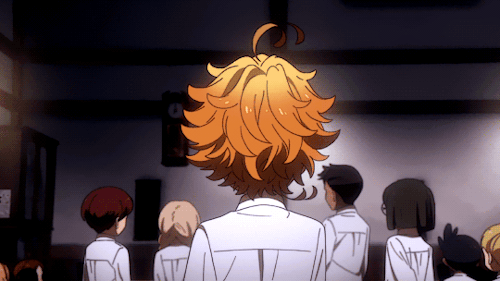
Treachery then is an additional narratorial pillar of the episode, as Emma, Norman and Ray come to the worse conclusion that it is not only Mom who has betrayed their trust and safety - but that one of their own has infected their ranks as well. At the moment this appears to be Emma’s quiet, bespectacled friend Gilda, as she is not only frequently shown concernedly watching over Emma, Norman and Ray’s actions, but because the employment of the ‘scary shiny glasses’ trope is rather telling. This trope is often used in anime to serve as an indicator of a character’s inhumanity, TV Tropes emphasising how the shinier they are, the more you should beware of how they deliberately isolate themselves and thus can justify their betrayal of those around them. This then is incredibly effective in indicting Gilda, especially as eyes are depicted as the catalyst of emotion and draw the most attention in the anime. The large and vibrant eyes of characters like Emma and Norman highlight their honesty and innocence, and thus the deprival of any light within them has an immediate chilling effect. The contrast between this and the opaque Gilda then sets her up as an easy target, however, we should also exercise caution - we are only three episodes into the anime after all, and for a narrative that has so far been so clever, it would be disappointing if this wasn’t an obvious red herring.
Focusing on the eyes then takes us back to the main insidious aspect that was aforementioned above - Sister Krone. Her eyes again are at completely another end of the spectrum: small, dark and slit pupils in white eyeballs, the pupils only shifting ever so slightly in shape in tune with her excitement and emotions. It actually causes her to seem far more easy to read, especially compared to Isabella, but this does not dampen her status as the adversary - on the contrary, if we were to say Isabella is Hades, then here we have Cerberus. Indeed, Sister Krone’s monstrosity is more brazen through her psychotic behaviour - whether that be her dancing around, talking and cradling her ragged toy baby in her room (not caring that her throwing it causes it to smack the ceiling) and talking in an overly patronising, sing-song fashion that evokes the insidious undertone to a favourite fairy-tale or nursery-rhyme.
From this description, the more bestial Sister may seem ridiculous, but just like with Isabella, it is clear that Sister Krone too is one to be feared - this being epitomised through her participation in the game of tag. Indeed, both we and Emma, Norman and Ray are forced to accept that she is a dire threat to their escape plan, for whilst up till now they had been using tag as a covert way to train the kids to escape, Sister Krone is able to crush this tactic almost effortlessly. Not only is she clever enough to lure out the kids, but she’s almost as fast as Emma, the animation again heightening the sense of the hunt with shots of Sister Krone looming over her prey with terrifyingly contracted eyes. What’s worse is that she knows the children - she thinks like them, this being accentuated whilst she looks for Emma as she and two other kids hold their breath and hide behind a rock (note the contrast of no music playing as opposed to the jolly parody of a fair-ground track played when catching the other kids). She knows their weaknesses, that Emma’s is her naïveté, and it is significant then that the moment she addresses this is when she creeps over the top of that rock (and scars Emma and all of us for life with THAT FACE) and catches her. Sister Krone then is not just a predator, but a good one, and we have been warned that her uncanny familiarity could serve to be the children’s undoing.
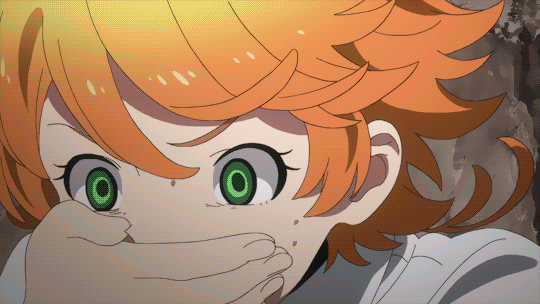
Tanika Lane
Image Credit: squirrelstothenut, mobpsycho100, jetstream-mat
11 notes
·
View notes
Text
‘Don’t Forget To Smile’
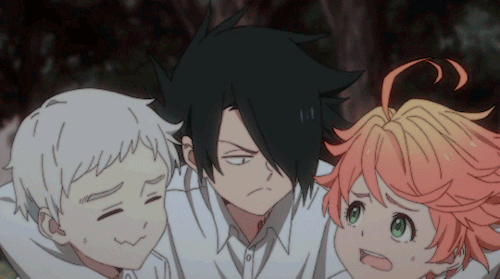
‘The Promised Neverland’ Episode 2 Review
The Pilot of The Promised Neverland was very much based on emotion, the emphasis on the horror setting our expectations for the events to follow at such a height that one couldn’t be sure the next episode could match up. Thankfully, it does not fail to deliver, and in many ways actually tightens the tension further. We have been able to digest the nightmarish reality that Emma, Norman, Ray and the other thirty-five children live in the orphanage as ravished meat, so the narrative now focuses on becoming more calculating; morphing into a cat-and-mouse dynamic, the orphanage becoming a chess board in the fight for survival.
SPOILERS AHEAD
Much of the episode is focused on how the kids come to answer many of the questions posed in episode one, the artfulness of the narrative being shown through how this then only creates more layers and complications in the bid to escape. We learn from Norman and Emma’s deductions that the reason the kids are made to take those tests is to deduce which is the best meat, the piece de resistance then being the brain. It seems then that the children you are younger are shipped out earlier when it appears that their brains are not getting any riper and so would be best to consume before they go bad altogether, the age limit of twelve perhaps being set for a similar reason. Watching this all unfold is already debilitating enough when you also realise how children are being forced to consider the legitimacy of themselves as delicacies, and it would be difficult not to appreciate the possible connotations of these transactions.
Indeed, it wouldn’t be far-fetched to suggest that the anime serves as a vegan allegory, as we are to forced to wonder whether sheep or cattle are also aware or contemplate their demises before being ‘processed’ - to put it in PG terms. Now you could argue that such a thing is ridiculous - that animals could never be as astute as human children. But animals are intelligent creatures, and humans are not supreme, just as adults - as this episode brilliantly establishes - are not necessarily superior in intelligence to children. If we really did believe this, then the resonance between us and monsters or demons becomes painfully obvious, and so the anime is incredibly ingenious to put this cruelty into perspective.
The characterisation in this episode definitely becomes more pronounced, as we not only continue to empathise with these kids’ plight, but we additionally start to invest and relate to them more. Their efforts to play the game evoke simultaneous pity and admiration, as they are burdened with forbidden knowledge in a sinister coming-of-age tale. Norman and Emma forcing themselves to smile at the start of the episode highlights their initiative, especially since the jaws-like opening with Emma’s dream explicitly reveals how this ordeal is taking a psychologically heavy toll. Norman, however, is the one to snap her out of dwelling in her emotions and advocating to reason. Indeed, his presence definitely becomes more pronounced for whilst he may seem like the one who always manages to stay calm and in control, there are moments which highlight that this is not always possible even for him, and so we become more drawn towards how he is still trying to persist despite the overwhelming pressure. This again evokes the reality that they are more than characters - they are just children, Norman’s fear being epitomised in the biggest scare moment of the episode when Mom appears out of nowhere next to Emma - her face inches away and looming awfully into hers.
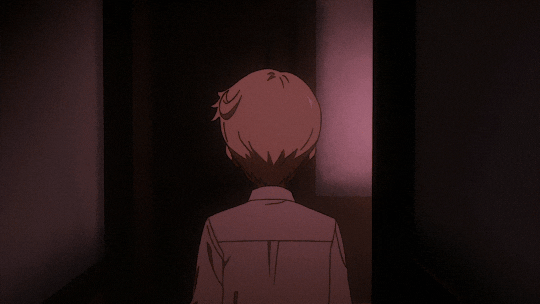
You can see how the anime is taking advantage of how transitions in the manga are less fluid as panels sometimes jump from one perspective to the next, but here this only serves as an advantage to heighten the unexpected and its resultant terror. Norman clearly hadn’t precedented this as you see him shaking around the corner, clearly as fearful of how Emma will handle the situation as we are. This then highlights even his naivety, especially since he earlier states his belief that he doesn’t think Mom knows exactly who left bunny at the gate - which to us again is obvious with Norman and Emma being the eldest are thus the only ones ballsy enough to tug the line. But we forgive this as they are children after all, and we wouldn’t blame Emma for losing her cool now as she, with what once was abundant love for Mom, has been the one struggling with the facade the most. Thankfully however she sports her mask with ease, even exceeding expectations as she not only gives Mom a hug. But, she casually ponders: ‘I wonder what Conny is doing now?’
Emma then becomes magnified in our esteem as she is not all hearts and playfulness, but harbours steel beneath her skin - and if anything, this moment shows how her love for others is not her weakness, but rather something we can take indulgent pleasure in as she can use this as her weapon.
What is perhaps the most endearing part of the episode then if finally seeing this golden trio come together, as Ray is finally let into the fold and we can more fully appreciate the different dynamics between the three. In fact, as dry and blunt as Ray self-confessedly is, his intervention actually provides some lightness and comic relief, such as his directness in admitting that he’d never believe the truth should it have come from Emma alone, along with how Emma’s immovable resolve in saving all the children exasperates Ray to the nth degree. Ray after all is the party that is the most realistic, border-lining into the inhumane in his insistence that saving everyone is downright impossible - this being all the worse because we know honestly that he’s probably right. The metaphor he evokes of the plan being akin to a boat made of mud is actually effective in stimulating our excitement further, as Norman insists on how mud can harden when applied with enough pressure. The Odyssean resonance of this whilst accompanied with a particularly stimulating score then grants a majesty to the moment, especially as we see Ray smile properly for the first time in the show when asked if he’s on board - as if he would be anything else.
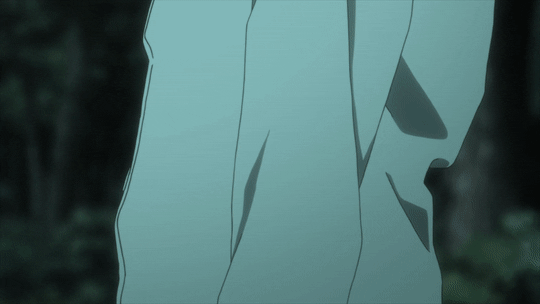
Unfortunately, just as hope seems to be rising to the surface again, so in turn do the obstacles rear their ugly heads. The episode ends with a new baby arriving at the House, along with, terrifyingly, Sister Krone - another adult. Whilst it is interesting to note that Mom could think the children enough of a threat that she would need reinforcements, the ticking clock accompanying the focused shots of Emma and Co's faces before the screen turns black emphasises how this is tantamount to their chances being cut in half.
The narrative then continues to build the stakes in time with how the children build up more resolve or find new solutions, especially as Ray highlights another danger that poses as a more subtle threat - the world outside. Ray believes that what they’ll have to survive on the outside is a world ruled by demons, this information actually being effective in stewing food for another line of thought rather than just plain horror. After all, if this is true, where are the humans? Are there humans? Is the world outside a dystopian world where humans are the subservient race? If so, how did it come to be like that? The second episode then is able to rope us in further as it not only appeals to our want of thrill but also to philosophy and contemplation, encouraging us to reign in again on the third instilment as we wait to see whether the pressure will actually surpass hardening their boat, instead pushing it to crack.
Tanika Lane
Image Credit: nicorobins, mobpsycho100, becauseilovedher
1 note
·
View note
Text
Welcome to the Dark Side – We have Kiddies

‘The Promised Neverland’ PILOT Review
With so much to indulge in from the seamless animation, atmospheric score and debilitating action, it is hard to know where to start addressing how perfectly this horror story has been put together. Indeed, one would be hard pressed to argue that ’The Promised Neverland’ doesn’t deliver one of the most ambitious Pilots to date, many other critics and viewers agreeing that this tale of orphans attempting to escape from their malevolent ‘carers’ gives international anime moguls the likes of Attack on Titan a well-earned run for its money. We are immediately captivated by the mesmerising aesthetics as well as the engaging characters in our protagonists of Emma, Norman and Ray, but what is especially engaging is how sublime this production is - how beauty only enhances our experience of terror, and how refreshing it is that a narrative need not be rife with gore and violence in order to make us want to peel off our skin.
MANY SPOILERS AHEAD
The plot essentially revolves around the thirty-seven orphans who live in supposedly blissful harmony at Grace Field House - a Victorian-esque establishment enshrined in woodlands where the children are free to do as they please; the three at the head of the ring being the sprightly Emma, ingenious Norman and pragmatic Ray. The only rule that is that the children are never allowed to approach the ‘gate’ or cross over the fence which snakes through the trees; for so long as everyone behaves under the ever-vigilant eyes of ‘Mom,’ there should be little to worry about. The existence of the gate in itself then is the immediate red flag that undercuts this bucolic reverie, the Pilot being quick to establish the essential parameters of the story (quite literally) so that we are made aware of the stakes from the inception. The gate is the very first shot we see as the three friends speculate about what lies beyond, this becoming more intriguing if one were able to compare this to Chihiro’s passing under the gate in Spirited Away. In that case, it was about the protagonist’s adventure to escape from the land of the spirits in order to return to where she belonged, so we are set up with a similar narrative yet with a distinctly darker undertone.
We still can’t exactly fathom why, however - is it the Professor Layton-esque background composition? The animation’s resonance with the sharpness of Tim Burton? Both these qualities in comparison to the colour and majesty of Miyazaki’s Oscar-winner sets the insidious charm of this anime into further relief, and if we are aware that Chihiro’s fate was to run into unruly spirits, we are led to dread what exactly lies beyond for our heroes here. After all, it isn’t difficult to become instantly attached to our heroes with Emma being established as a typical shonen-heroine. Athletic, full of beans and mollycoddling the other children, her charisma establishes her as the foremost protagonist that the action will mainly revolve around. Her companion Norman too comes across as kindly and affectionate, he being noted more for his status as a genius amongst the children, whilst the more reserved Ray is an object of mystery; spending most of the episode observing from the side.
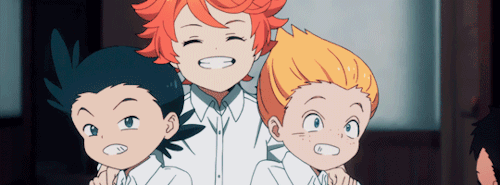
The unfolding action soon divulges that the maximum age that the children are known to stay at the orphanage is twelve years (the three main protagonists already being eleven) and apparently as soon as the children leave to supposedly join their adoptive families, they never make contact again. The way we obtain this information then is incredibly effective in establishing that initial sense of unease and dread then as we learn this via the kids themselves. They lament over how their old friends never bother to visit or write, this being very telling of how it is not so much that they don’t - but can’t. It then becomes even more heart-rending when children start detailing their dreams about the lives they want to have once they leave the house, this causing you to squirm as the narrative is emphatic about the humanity of these kids and how easily the viewer can become invested in them. This then makes the truth of their situation more mortifying and our suspicions established at the beginning perhaps worse than justified. The house, their home, is a farm; their beloved Mom works to perfect meat for Demons, and the delicacy she specialises in are the kids, her ‘precious children,’ themselves.
This revelation coming about when Emma and Norman sneak out to the gate to give Conny, one of their youngest and latest to leave the house, back her toy bunny, firmly establishes that the stakes are set and that the rest of this story will be a race of survival. The persistent motif of the clock suddenly makes sense; it is illustrated as looming in the background behind Norman and ticks ominously around the moment of truth. There are additional symbols that are established to evoke our curiosity like the red flowers growing out of Conny’s corpse, and the meaning behind the ID numbers tattooed to the children’s throats becomes increasingly formidable. But what is especially evocative is the role of the villain that is established in Mom. After all, throughout the episode, she has a smile plastered to her face and we frequently hear just how much the children - Conny and Emma in particular - love Mom very much. Now her expression is cold and mask-like, allowing us to make sense of how her former warmth seemed two-dimensional and her hugs mechanical, as she is nurturing not living beings but expensive merchandise.
The use of expression and the music is the critical component of this terror - something which anime will perhaps always have the upper hand in over live-action as every detail is able to cut into us far more seamlessly than any real human expression can. As is common in anime, the most particularly captivating aspect is the eyes, and in the gothic fashion, they really are the windows to the soul - the perfect insight into how Emma and Norman’s realities have been ripped apart to become void and null.
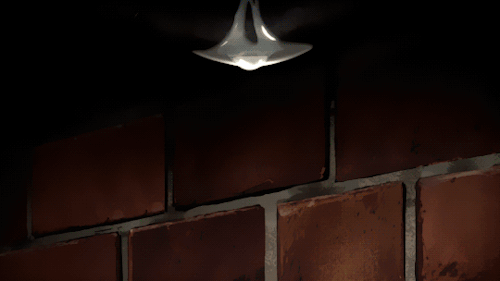
This is only doubly effective of course due to the execution of each scene in the anime, as one moment of normality will be suddenly undercut by terrified eyes and make us seize in turn. This is even more pronounced with the use of music as it is usually a relaxed or jazzy accompaniment of the action but will be cut and jarred suddenly by screeches or silence. This is taken the fullest advantage of then in that final shot of the Pilot as we initially see Norman trying to comfort a bereft Emma with the promise of escape. The music which accompanies this is a heavenly soothing chorus, a typical melody to embellish that sense of hope, only to be horrifically punctured with a shot of Mom’s that will knock the wind out of you every single time. She’s holding Conny’s bunny and we’re thinking the same thing: she knows.
So the horse has bolted - the game more than any harmless round of tag but a trial of life and death. What makes that final shot even more significant is how we might be used to being presented with seemingly unconquerable odds in all forms of media, but this anime wants to firmly establish how this is going to be more difficult and disturbing a journey than most. This Pilot has completely distorted the meaning of ‘Neverland’ forever, as Peter Pan’s concept of children never growing up has been awfully literalised. The place we once wanted to run away to now has become that which we are desperate to sprint away from, the irony being that you could not be more excited to see how Emma, Norman and Ray are inevitably going to be forced to make their first move.
Tanika Lane
Image (Gifs) Credit: dragonsofarcadia, kizunah, mangastream
#the promised neverland#tpn#yakusoku no neverland#ynn#ynn spoilers#pilot#review#own writing#filmsandtelevision#animation
6 notes
·
View notes
Text
TV REVIEW: Marvel’s Daredevil Season 3

Beautifully executed and brilliantly gruesome, Daredevil season 3 picks up the pieces from both its second series and the aftermath of The Defenders to gift us with a personal best for the show and as the flagship for the Netflix/Marvel franchise.
It felt far more packed with adrenaline and had higher stakes than season 1 but was able to be maintained in a way that didn’t lose focus like the second half of season 2. The subplots all complimented the main storyline rather than veering off in different directions to flag up other narratives (which admittedly was necessary to set up the debut for The Punisher), and thus landed us with a well-round season that (with a nod to Fisk himself) tied up most loose ends.
It was a clever touch how Matt Murdoch never worse his suit all season. It likened back to his origins in season one, but unlike that agonising aspect of having to keep his partners-in-crime Foggy and Karen in the dark, it was more satisfying to see how he was still connected to the two in their own ways. In fact, the fragmented trio felt more compelling to watch as we saw them two at a time on screen – Matt and Foggy then Foggy and Karen and then Karen and Matt etc. – so that when our beloved firm finally came together in the penultimate episode of the series, it was both a highly emotive reunion and an effective means to build excitement as we rallied with them into the final stage of the story.
The range of characterisation this season must be applauded, as we were treated to exploring different angles to the characters we already love as well as being indulged with new faces as well. Agent Rahul ‘Ray’ Nadeem was a favourite to watch; his attempt to clean up crime in Hell’s Kitchen and support his family via trying to control Fisk was irritable at first, but his noble attempt to recover from this and stick to his guns as an honourable FBI agent was incredibly commendable. It only made what eventually happens to him more shocking and therefore rueful, but the fact that the show decided to follow through with this execution of a character with so much potential is what Daredevil to be a truly ambitious bit of television.
Sister Maggie was another gem that added a rich sense of pathos to the season, not only given how (SPOILERS) it is revealed that she is Matt’s mother, but also given the way the show used her to examine post-partum depression. Having such a sensitive subject mixed in with the congealed ethics of religion proved incredibly compelling, especially given how Matt’s decision to leave the safety of the Church after he realises the truth allowed for the particularly excruciating scene of Maggie crying over his empty bed. It was almost as if her child had died again, the portrayal by Joanne Whalley being so beautifully harrowing that it would be criminal to think she won’t be back for season 4.
As for Fisk, he proved a far more terrifying figure and a far worthier adversary than before, and what perhaps makes him worse is how much more noticeable it is to find him so believable. You know he’s lying, and yet you always find yourself so close to empathising; his rhetorical prowess being so convincing that he may have evoked the respect of Pericles himself. This is perhaps what makes him so fascinating to watch, as it’s not Fisk’s physical strength that makes him so dangerous (as fight scenes involving Fisk are actually when he’s at his least interesting) but rather the extent of his formidable influence through temporality and hear-say. He has the effect of a particularly vengeful Ovidian God; looking for the woman he loves and not caring for the consequences as the innocents fall like flies around him. As Hermione Granger rightly states, ‘fear of the name only increases the fear of the thing itself’; and we find this season that that’s exactly what ‘Kingpin’ does.
It was probably due to the riveting execution of the action sequences that I couldn’t have stopped watching if I had wanted to. From the massacre at the Church even to the small-scale gunfight at Nadeem’s own house, each conflict had its own depth that made it hard-pressed to say that anything that transpired could be described as boring. The red and black colour scheme of the Church shooting was magnificently morbid, especially since the end of this episode may have held a particularly exciting Easter egg in the form of Karen cradling Matt’s injured body in front of the crucifix. It seemed uncannily reminiscent of how (SPOILER), in the comics, Matt holds Karen’s body in just the same way (the same place even?) after she is killed by arch-nemesis Bullseye. Considering how pre-Bullseye alias Benjamin Poindexter survives the end of this series, it wouldn’t be too farfetched to suggest that this flip of iconography may be a tragic of portent of what awaits Karen in seasons to come. The last image of the christening of ‘Nelson, Murdoch and Page’ may therefore only be a short-lived taste of happiness before Bullseye is finally brought to fruition, and yet despite the awareness of this likely heartbreak, the next instalment of Daredevil cannot come around soon enough.
Tanika Lane
Images: The Digital Hash, Radio Times, Rolling Stone
Original Post: http://www.thegryphon.co.uk/2018/11/02/tv-review-daredevil-season-3/?fbclid=IwAR00iyEWT5G53Lk3mHb0UvDexpb1Pw-aA6Q_34l3bZsUtxnn-lHZdjZ2Jpw
0 notes
Text
TV REVIEW: BBC’s The Cry

What interested me most about watching BBC’s The Cry far more than the show itself was the fact that so many people had told me they couldn’t bear to watch something involving something horrible happening to a child. It threw into sharp relief how comfortable we are with thrilling television such as the Bodyguard: bomb-scares after every other scene, questionable depictions of what essentially comes down to Islamophobia and sexual affairs that threaten both bedroom and state – but mention a child dying, and no-one wants to know about it.
This is what made me really want to like The Cry. I wanted to find it as psychologically intense as its Sunday-night predecessor with the extra edge of emotional complexity granted by its more harrowing and personal premise. But unfortunately, the final verdict is that this ‘thriller’ rather falls flat of its potential. The Cry definitely had its own sense of grit; this much is undeniable. We empathise with Jenna Coleman’s portrayal of haggard mother Joanna as every manner of opposition appears to close in on her, from the typical harassment of the media, the scrutiny of the law, and even the intimidation and perverse intentions of her own husband.
What may have been the fault of the drama then is how a show that is meant to be about a child-kidnapping becomes far more engrossed in trying to convey the mental and emotional void experienced by Joanna in the wake of losing Noah, so much so that it would be hard to deny that you lose all feeling for the lost child altogether. Because as much as you might want to empathise with Joanna, she really isn’t that compelling a character. She’s understandable, but the way the show is executed prevents her from being entirely relatable.
In fact, it would be hard to argue that you could find a care for a single character in this drama. Joanna’s husband Alistair (played by Ewan Leslie) admittedly succeeded in being a grotesque villain. He was a villain however that amounted not so much as to a spider catching you unawares from a dark corner, but more to a particularly bulbous slug slathered to the bottom of your shoe. He wasn’t a villain that you wanted to unravel or embroil yourself in further, but rather he exhausted you from the instant he appeared on the screen. The rest of the cast (many being members of Alistair’s or his ex-wife’s family) evoked a similar sense of frustration and annoyance that again was more deterring rather than engaging. Ex-wife Alex just seemed to be full of pointless rage and was completely unconvincing in the fact that she couldn’t relate to Joanna on any level.
True, Joanna was the reason that she had to split from Alistair in the first place (the other woman etc.) but both women were mothers and eventually came to despise Alistair, yet they were never depicted as being the least bit comforting or on the same page as one another. It makes the same mistake then as Doctor Foster, in the fact that we weren’t at least granted the indulgence of watching two women come together in the face of their collective emotional abuser. And let’s not get started on the irrelevance of Alistair and Alex’s daughter. Someone just really needed to sort her fringe out.
This was perhaps the main problem with The Cry – not the fringe of course but the fact that the show focused too much on the abstract idea of Joanna’s pain and isolation, from how we’re swallowed up by the billowing Australian landscapes and sobering background music to experiencing re-enactments of the voices and criticisms Joanna reads online. The show tried to be too clever, and consequently became too slow. A housemate even commented that every time she passed through the living room whilst I was watching an episode that it was very peculiar that nobody ever seemed to be talking. The focus on cinematography made a storyline that is meant to be excruciatingly intimate feel inhuman at best and tedious at worst.
The one element of cleverness that can be commended however is Joanna’s last line of the first episode, in which she and Alistair are preparing for a television interview (shout-out to the McCann’s) and he asks her: ‘do you think it will cry?’
This alone was very effective, a parody of how women are constantly told to smile. It demonstrated how, no matter the situation, women are used as prop-pieces for the benefits of their male counterparts; that women are the ones burdened with having to put on a performance for whatever society wants to see. This alone was a commendable piece of writing, and again is what almost endears you to try to relate more to Joanna’s plight. But the promise of this one line is failed as the onslaught of action (or not) that follows, the vacuous narrative ultimately causing you to care as much about what happens in this drama as Alistair did for baby Noah. Not very much at all.
Tanika Lane
Images: BT TV, BBC, The Arts Desk
Original Post: http://www.thegryphon.co.uk/2018/11/02/review-the-cry/?fbclid=IwAR05mIaDG6Ahuf2tm8fudZymLHVnIk35BvSgRs_oN0WyuWw195MYAadQzuE
0 notes
Text
TV REVIEW: There She Goes
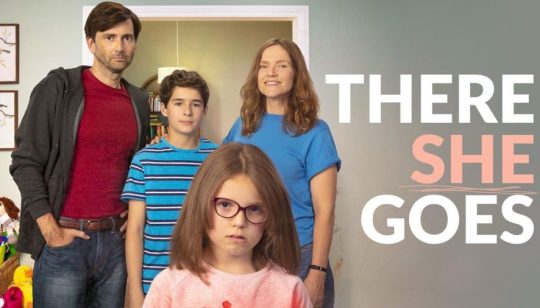
BBC’s newest mini comedy-drama is perhaps one of the most refreshing and courageous endeavours to grace our small screen. Whilst it may not harbour heart-stopping suspense or sweeping grand-scale cinematics, There She Goes is an incredibly intimate and honest piece of television that invites us to explore the day-to-day shenanigans of a couple trying to raise their daughter Rosie and navigate through her learning disability. Though it is a simple premise, it is unexpectedly harrowing and conveys a rare sense of depth that parents can relate to.
What is particularly impressive about the drama is the sincerity and dedication that is clearly put into this production by both cast and crew. David Tennant, as Rosie’s father Simon, may be the initial reason to giving this show a try, but it’s his on-screen partner Jessica Hynes incredibly stimulating performance as overwrought mother Emily that will keep you watching. You come to find that the focus on Rosie herself is arguably not even the most compelling part of the drama, but more what the effects of raising a child with learning disabilities has on the rest of the family. We see this through how the drama has two parallel narratives: one in 2006, shortly after Rosie is born, and one in 2012. This is where the unexpected profundity comes in, for although in 2012 we may have a compassionate giggle at Simon taking Rosie to the gym because she enjoys watching women do their work-out (and consequentially doesn’t make her father look dodgy at all), 2006 sees the whole family dynamic on the brink of collapse. Rosie is still undiagnosed and mother Emily seems to be the only one prepared to take the bull by the horns and do anything about it.
It is clear 2012 Simon still struggles more than his wife to understand and keep up with their daughter, but 2006 sees him downing a bottle of red wine every night and congratulating himself on the fact that he put in the effort to take out his daughter for one day. Meanwhile Emily appears far more physically sagging and on the edge of an emotional breakdown. The most compelling part of Hynes’ performance is how she can manage to pull off the fact that Emily honestly feels like she’s not sure she’ll able to ever truly love her daughter without coming across as horrifically heartless.
The show is an examination of the dynamics not only within motherhood but also alongside fatherhood. It touches on how it has actually become much of a running joke on social media how fathers and husbands will congratulate themselves – and be congratulated upon by others – for making a ‘special effort’ with their children, when what they have achieved is a fraction of what mother is expected to do every day.
In fact, what makes this even more extraordinary is that Emily is constantly doubted, ridiculed and rebuffed for knowing something isn’t right about the state of her daughter. It is a very clever use of dramatic irony as we feel the frustration Emily experiences in knowing something more is at play here. It’s very effective to see that even when mothers do attempt to do everything in their power for their children, their capabilities are diminished as irrationality.
The beauty of There She Goes is that it seems to be happy to dispense with political correctness altogether. We can take heart in the fact that the show isn’t tone-deaf, considering how creator Shaun Pye has based the show purely upon his experience with his own daughter, whose condition is so rare that it does not yet have a name. That isn’t to say that the show is without its charm – it is part comedy after all. True, there is no inclination that the family now has all the answers, but it is reassuring to see that having disabilities within a family are not an apocalyptic situation, but rather something we can grow from and learn to have a laugh about as well.
Tanika Lane
Image: tvserieshub.tv
Original Post: http://www.thegryphon.co.uk/2018/11/16/tv-review-there-she-goes/?fbclid=IwAR1_cf5N2uy1ZODLHWH6NiEQVuSUtIywBaVclDgfGMQniHuEUn6hSbmGYQI
1 note
·
View note
Text
Ophelia: Not Another Shakespeare Story

So - the verdicts have started to pour in on the latest instalment in an innumerable line of Shakespearean cinematic adaptations. Claire McCarthy’s British historical romantic drama Ophelia, the damsel in question being depicted by Daisy Ridley, has been slandered by the Guardian as lacking any emotional investment; Variety deems it no better than a bric-a-brac of sub-par secondary school student intel; and Rotten Tomatoes was only generous enough to gift the flick with a measly 56% rotten scoring on the tomatometer. In essence then, from a critical perspective, the ambitious attempt to flesh out Hamlet’s narrative from the overwrought Ophelia’s perspective has a had about as much of a successful sink or swim chance as the titular character herself. When looking at this outcome alone, it isn’t surprising that the relevance of Shakespeare is called into question, and whether the film and television industry should be wasting valuable time and money in rehashing ancient material – especially if this isn’t even going to be dedicated to material of a high standard.
However, despite the discerning the critical eye, you’ll find that the average approval rating based purely based on the average audience member comes to an impressive 99%. Indeed, if you were to scroll down the page and browse through some of the more optimistic takes on the film, you’ll find that many voice the opinion that this newest take on the classic narrative is ‘colourful and clever,’ allows audiences to explore a character from a radically new perspective, and that Ridley’s performance actually proved inspiring and entertaining. This then is what reminds us of why there are so many remakes and reinterpretations of classic narratives such as Shakespeare and Disney: because audiences love the story. We spend so much time looking at film and television from an academic pedestal and trying to give off the impressions that our noggins are bigger and pinker than they actually are, that we forget how such an industry was founded on the ability to entertain.
Having typed this of course, I can already hear the wave of indignant hisses and screeches attesting to the contrary – that all art is political, to entertain is to teach, everything has a more implicit meaning with Ovid and Chaucer bringing up the rear etc. etc. In that case then, if we are to insist on the educational value of art, then we have to acknowledge how we can still learn to appreciate classic material from different perspectives. After all, our society is ablaze with so many different movements and ideologies coming to the forefront that were not readily accepted or encouraged when the original narratives of Shakespeare and Disney were in their prime, so perhaps we should see it more as an opportunity that we are allowed highlight elements of curiosity in material whose potential was not properly brought to full fruition – the roles of women for instance (obviously).
There’s also the fact then that classic material isn’t just the fodder for Hollywood alone (since we are all in agreement now that Britain and America do not actually mark the middle of the universe ahem). Indeed, the works of Shakespeare provide inspiration for all kinds of different cultures and societies, some adaptions perhaps even providing far more fulfilling and enlightening takes on well-known narratives than Hollywood can ever hope to conceive. One masterpiece that springs to mind in fact is that of the Sanjay Leela Bhansali’s 2013 Bollywood (bear with me here) production Goliyon ki Rasleela Ram-Leela – a stunning and intense revision of Romeo and Juliet. True, the film may take massive liberties in its correlation to the original narrative and the wonderful ingenuity of it may be due to how cultural singularities allow for wonderful sparks of originality, but this film in particular would never have come to realisation if it were not for Shakespeare.
Perhaps then we can agree that it is not so terrible that we keep returning to the same narratives to provide us with inspiration and entertainment, as it is not so much about the name that is being recycled so much as the universality of the narrative. After all, what is there not to relate to in either Shakespeare or Disney: monopolising emotions and explorations of identity, harrowing displays of tragedy and pathos, questions of morality and an embrace of different cultures? The plays of Shakespeare and films of Disney encompass all these factors, so it is perhaps not so much that we keep specifically returning to their works for the sake of a name (though, let’s be honest, money and business will always be a mysterious astrological factor here) but rather that they just so happen to contain so many relatable elements. Ophelia may not be a resounding success then, but neither is it proof that Shakespeare is overrun. If anything, it’s imperfections are rather more proof that McCarthy’s vision has further scope for growth and maturation, and so the fact that a playwright’s ideas from over 400 years ago still have hidden gems to be polished and amplified is rather less tedious than it is exciting.
Tanika Lane
Image credit: variety.com
Original Post: http://www.thegryphon.co.uk/2018/11/27/ophelia-not-another-shakespeare-story/?fbclid=IwAR0NaedcetGFREX7XOXm10bex-nzd4n55Jc5hTAMJZ6frzAXYaLiY2j_d2M
0 notes